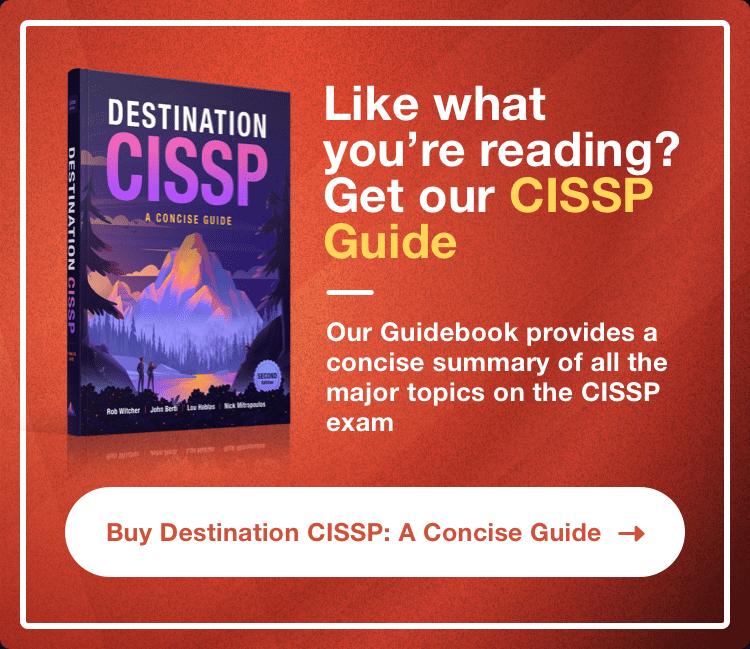So, you're gearing up to take on the Certified Information Systems Security Professional (CISSP) exam, and you’re probably wondering how difficult it is. You're not alone, many CISSP aspirants have this looming question in mind, especially since this exam has quite the reputation.
Picture it like a gargantuan pool of knowledge stretching a mile wide across various domains—from cryptography to risk management. But here's the thing—it's only an inch deep. You need to understand each topic but don't expect to get grilled on hyper-specialized details.
This test isn't just broad; it's intricate. All these topics aren't standalone; they're intertwined and interconnected, demanding a holistic grasp of information security. So, what's making this exam such a challenge?
In this article, we'll dissect the factors that contribute to CISSP difficulty, answering the looming question: Is CISSP hard to pass? We'll also knock down some common CISSP myths that either undersell or overhype the test and provide some tips that will help you conquer this beast.
Let’s begin!
How hard is CISSP?
The short answer: becoming a CISSP is a difficult path to take. Apart from ensuring you acquired all the CISSP certification requirements, you also need to equip yourself with the knowledge to ace the exam. But it's not as impossible to get certified as it seems to be.
However, before you begin your journey. It’s important to understand the path you’ll be taking. The first step? Understanding the difficulty of the certification test, so you can prepare yourself for what lies ahead. With this in mind, how hard is the CISSP exam?
Well, several factors contribute to its challenging nature, from the extensive range of subject matter to the intricate questions and the ticking clock you'll be racing against. Let's break down these elements to give you a clearer picture of what you're up against.
Wide range of topics
The CISSP exam covers an astonishingly broad array of cybersecurity domains. We're talking about everything from risk management and data governance to cryptography and networking. These domains of CISSP are part of what makes the exam so challenging. It's not just about mastering one area; you've got to be a jack-of-all-trades in the information security world.
Question complexity
Beyond the sheer volume of topics is the complexity of the questions themselves. You'll be dealing with a blend of multiple-choice questions and advanced innovative items that assess not just your rote knowledge, but also your ability to apply that knowledge in real-world scenarios. These questions can be multi-layered, asking you to resolve situations, analyze data, or make choices that demonstrate a deep understanding of the subject matter.
Time constraint
Another factor that contributes to the CISSP exam difficulty is the time constraint. The exam comes in two formats: CAT (Computer Adaptive Testing) and Linear. All candidates who will take the exam in English will follow the CAT format while those taking it in Chinese, German, Japanese, Korean, and Spanish will follow the linear format.
In the CAT version, you'll have 4 hours to answer a range of 125 to 175 questions. The exam adjusts its difficulty based on your performance; answer a question right, and expect a tougher one next. Mess up, and you might get an easier follow-up question. This adaptive nature means each question can be crucial to your overall score.
On the flip side, the Linear format is more traditional. In this version, you're up against 250 questions over a grueling 6-hour period. Unlike the CAT format, the Linear exam doesn't adapt based on your answers; everyone faces the same set of questions. The sheer length and fixed question set make the Linear exam a true test of endurance.
Is the CISSP exam hard to pass?
That's really up to you and how you approach it. Sure, the exam is a beast, covering a boatload of topics, throwing complex questions at you, and putting you under a ticking clock.
But let's cut to the chase: It's designed that way for a reason. The CISSP isn't some entry-level certificate; it's one of the most respected and valued certificates in the infosec world. You're supposed to sweat a bit.
Your experience and preparation are going to be the game-changers here. If you've been in the cybersecurity trenches and you know your stuff—plus, you take the time to prepare adequately—then you'll find the exam challenging but entirely doable. If you're new to this, or if you're trying to wing it last minute, expect a brutal wake-up call.
At the end of the day, the exam is as tough as you make it out to be. Arm yourself with thorough preparation and a solid game plan, and you can turn those infamous challenges into a showcase for your expertise.
Common CISSP certification difficulty myths debunked
There's a ton of hearsay and myths floating around about the CISSP exam, and buying into these can either give you a false sense of security or scare you off completely. So let's put some of these rumors to bed, shall we?
Myth 1: You can pass CISSP without preparation and experience
Let's clear the air right off the bat: The CISSP is no joke, and it's definitely not an entry-level gig. The idea that you can just waltz into the exam room with zero preparation or experience in cybersecurity is like thinking you can win the Tour de France without training. The CISSP exam covers a myriad of complex topics and demands a level of understanding that only real-world, hands-on experience can offer.
Can you pass CISSP without experience?
Technically speaking, it's possible, but it's going to be a Herculean task. The amount of effort and time you'd need to invest would be astronomical. Even if you manage to clear the exam without direct experience, you won't be CISSP certified right off the bat.
Instead, you'll earn the status of an Associate of ISC2. This gives you a sort of probationary period where you have up to five years to rack up the necessary work experience to become fully CISSP certified.
So, can it be done? Theoretically, yes. Should you do it this way? That depends on you. If you enjoy climbing mountains in flip-flops, sure. But remember, you have to prepare twice as much as those with experience. Look into enrolling in a proven and tested CISSP MasterClass, and try to answer as many practice questions for CISSP exam as you can.
Myth 2: CISSP is impossible to pass on the first attempt
Another one we hear a lot is that the CISSP exam is nearly impossible to crack on the first go. While it's true that the exam is tough, it's far from impossible. Plenty of candidates pass on their first try. Usually, these are the folks who've taken the time to study systematically, understand the breadth and depth of the material, and go in with a solid strategy. There are no guarantees, but the impossible label? That's just noise.
How to pass the CISSP exam in first attempt
If you're looking to pass CISSP in first attempt, there are several things you can do to tilt the odds in your favor.
First, don't just limit yourself to reading materials. Engage with other forms of learning such as video lectures, online forums, and if possible, training sessions led by professionals. The more diverse your preparation methods, the more well-rounded your understanding will be.
Next, make use of a CISSP practice questions app. These apps can simulate the actual exam environment, giving you a sense of the type of questions you'll face and the pace you'll need to maintain. It's a fantastic way to get a feel for the real thing, all from the convenience of your mobile device.
Remember, the CISSP exam is not just about memorizing facts; it's about understanding concepts and applying them in various scenarios. The more you practice and understand, the better your chances of joining the ranks of those who've managed to pass the CISSP in their first attempt.
Myth 3: You can fast-track your way to CISSP
We get it—time is money, and everyone's looking for a shortcut. The allure of a CISSP fast-track is tempting, to say the least. Who wouldn't want to bypass months of grueling study and jump straight to the finish line? If only it were that simple.
Boot camps: A supplement, not a shortcut
Yes, CISSP boot camps are a thing, and some are really solid for quickly leveling up your understanding. But let's set the record straight: a boot camp is not your golden ticket to CISSP certification. While these intensive courses can be great for cramming a lot of information into a short window, they're not designed to replace the kind of deep, applied knowledge and hands-on experience you'll need to truly master the exam.
Think of boot camps as a concentrated juice: rich in flavor but lacking the fiber and full nutritional value of the whole fruit. They can sharpen your skills and fill in gaps in your knowledge, sure, but they're not a stand-alone solution. You'll still need to supplement that with a balanced diet of study, practice, and real-world experience if you're serious about passing this rigorous exam.
How to overcome the CISSP exam difficulty?
Despite the difficulty of the CISSP exam, passing it is more than achievable with the right approach and mindset. Here are some CISSP tips that give you that much-needed edge to ace the test:
- Start early, and stay consistent: The CISSP exam isn't a sprint; it's a marathon. Start your prep work early and maintain a steady pace.
- Master the domains: The exam sprawls across multiple domains, each deserving your full attention. Don't skimp on any of them
- Focus on quality over quantity: Pounding through practice questions isn't the goal. Understand the 'why' behind each correct answer.
- Leverage a CISSP practice questions app: The digital age requires digital solutions. Utilize a practice questions app to get a feel for the real exam.
- Deep dive into the 'why': When reviewing questions, focus on understanding why the correct answer is what it is. CISSP aims to test your understanding, not just your memory.
- Time management matters: Whether you're taking the CAT or the Linear version, time is of the essence. Make every second count.
- Review like your life depends on it: Go over all questions—right or wrong. Reinforcement and correction are both crucial.
- Use multiple study avenues: Books, online tutorials, videos, forums—mix it up to get a well-rounded understanding.
- Join a study group: Benefit from group wisdom. What you missed, someone else might catch.
- Health is wealth: You're not a machine. Take breaks, eat well, and sleep adequately. Your brain functions better when you're physically fit.
FAQ
Yes, it is possible to pass the CISSP exam within 3 months, provided you have a strong foundation in the domains covered by the exam and dedicate sufficient time to study. A disciplined study plan focusing on areas of weakness and a review of the ISC2 CBK (Common Body of Knowledge) can aid in achieving this goal. Some candidates can even pass the exam by simply attending our 5-day live bootcamp, which has a proven track record with a pass rate over 90%.
The CISSP exam primarily consists of multiple-choice questions, but it can also include innovative item types (IITs). IITs are designed to assess a candidate's practical skills and may involve different formats, such as drag-and-drop or hot area questions. The focus is on applying knowledge rather than just recalling facts.
Absolutely, the CISSP certification remains highly valuable and relevant in the field of information security. It is recognized worldwide and demonstrates a high level of knowledge and competence in information security.
CISSP is significantly more difficult than Security+ because it requires a broader and deeper understanding of information security principles and practices, along with a minimum of five years of professional experience.
Is the CISSP exam worth the difficulty?
Yes, absolutely. Earning a CISSP certification isn't just another feather in your cap; it's more like an eagle landing on your resume. This certification is globally recognized and highly respected in the cybersecurity field.
Most importantly, CISSP holders often find themselves on the higher end of the salary spectrum compared to non-certified individuals. We're talking about substantial bumps in pay and even greater opportunities for career advancement. So yes, the exam may be indeed challenging, but the rewards are surely worth your while.
If you're pumped and ready to dive into the CISSP journey, don't let another moment slip by. At Destination Certification, we offer a MasterClass that will make the CISSP exam feel less like a monolith and more like a challenge you're prepared to tackle.
Our CISSP certification training program isn't a one-size-fits-all program. It's designed to focus on what you don't know, fine-tuning itself based on your unique gaps in knowledge. Whether you're taking an assessment, studying with flashcards, or diving into a practice exam, our system adapts to show you exactly what you need to focus on. This means you’re not just studying; you’re studying smart, covering your blind spots and boosting your strengths.
Rob Witcher
Rob is the driving force behind the success of the Destination Certification CISSP program, leveraging over 15 years of security, privacy, and cloud assurance expertise. As a seasoned leader, he has guided numerous companies through high-profile security breaches and managed the development of multi-year security strategies. With a passion for education, Rob has delivered hundreds of globally acclaimed CCSP, CISSP, and ISACA classes, combining entertaining delivery with profound insights for exam success. You can reach out to Rob on LinkedIn.




